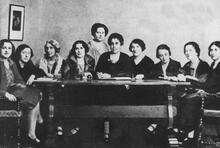Romana Goodman
A staunch feminist and passionate Zionist, Romana Manczyk Goodman found a way for women to contribute to the dream of a Jewish state by helping establish the influential Women’s International Zionist Organization (WIZO). After their 1907 marriage, she and her husband attended the Zionist Congress at The Hague where she became a founding member of the Jewish Women’s League for Cultural Work in Palestine. Goodman helped lead the 1914 Annual Conference of the English Zionist Federation, and in 1918 she cofounded the Federation of Women Zionists (later WIZO). She also served as president of two Women’s International Zionist Conferences in 1923 and 1925 and remained active in WIZO until her health forced her to retire.
Early Life

Courtesy of Marilyn Lehrer.
Romana Manczyk was born on April 24, 1885, in Warsaw. Her father died when she was in her early teens and her mother then married a dealer in spectacles whose surname was Fischel. Romana’s stepfather moved to America with his new wife and family, probably very soon after their marriage. They lived in Colorado, where she attended the Denver High School. At this time her surname was spelt Montchyk.
Romana married Paul Goodman (1875–1949) in the spring of 1907 and they lived in London. They had two sons and a daughter. Maurice, born in 1909, married Vera Appelberg; Carmel Roma, born in 1912, married George Webber; Cyril, the youngest child, born in 1915, became a solicitor and married Ruth Sabel.
Beginning of Zionist Activism
Paul Goodman, born in Dorpat (now Tartu), Estonia, was Secretary of Bevis Marks, the Spanish and Portuguese Jews’ Congregation in London. In addition, he was a prolific writer on Jewish and Zionist history (History of the Jews [1911], The Synagogue and the Church [1908], Moses Montefiore [1925], etc.). But his main passion was Zionism, and he was one of the prominent personalities in the early Zionist movement in England. It is not clear whether Romana was already interested in Zionism when she met him, or whether she became interested in it because of him. Be that as it may, it became a passion that they shared. In August 1907, three months after they married, they went together to the Zionist Congress held in The Hague. Romana immediately became involved in the Verband jüdischer Frauen für Kulturarbeit in Palästina (The Jewish Women’s League for Cultural Work in Palestine), which was founded at that Congress, and was appointed treasurer of the English branch.
The Sunday tea parties held in Hatikvah, the Goodmans’ London home, were the meeting-place of prominent Zionists from London and abroad, with Chaim Weizmann and Nahum Sokolov as regular guests. Thus Romana was at the heart of Zionist life in England.
It is obvious from what Rebecca Sieff wrote about her that she was a suffragette, a feminist, and a keen supporter of women’s rights. She must have chafed at the role that society imposed on women in her position, restricting them to being wives and mothers. She devoted herself to Zionist work, using her obviously outstanding organizational talent, and began to play an increasingly large role in the movement.
WIZO and Zionist Organizing
In 1914, at the Annual Conference of the English Zionist Federation at which Paul Goodman became honorary secretary, Romana joined the Executive. But soon many of the women involved in the English Zionist Federation began to feel that they wanted to form their own separate movement. Romana was one of the key women involved; with Rebecca Sieff as their leader, a small group of dedicated women formed the Federation of Women Zionists in 1918. While Rebecca Sieff was certainly instrumental in founding the FWZ, she was not alone. Rosalie Gassman, the official historian of the FWZ, describes the pivotal role played by Romana Goodman in the founding of WIZO:
“The war being over, Mrs. Goodman re-established connections with the Cultural League [The Jewish Women’s League for Cultural Work in Palestine] branches in Germany, Poland, Holland and Moscow as well as in Palestine, and succeeded in arousing their interest and sympathy in the plans for an international body of Zionist women.” In fact, soon after the war ended, she began to travel extensively to visit these groups, in order to persuade them to affiliate to the new movement. In this way WIZO gained immediate representation in Europe and a solid base on which an international organization could be founded.
Later Life and Career
As vice president of WIZO, Romana continued to exercise her considerable energy in working for the Organization and Propaganda Department. Twice she served as president of Women’s International Zionist Conferences, in Karlsbad in 1923 and in Vienna in 1925. In 1925 she first went to Palestine, seeing for herself all the work done by WIZO and meeting all the people involved. She was to go again several more times. In 1931 she sent her daughter Carmel, then aged nineteen, to spend several months there.
In addition to her WIZO work, Romana had become involved with B’nai B’rith, in which her husband was also very active. In 1919 she was instrumental in forming the First Women’s Lodge of England. She remained active in WIZO until her health declined. She died in April 1955.
Berg, Gerry. “Zionism's Gender: Hannah Meisel and the Founding of the Agricultural Schools for Young Women.” Israel Studies 6, no. 3 (2001): 135-165. muse.jhu.edu/article/14479.
Grove-Pollak, Fay. The Saga of a Movement: WIZO 1920-1970. Tel Aviv-Yafo, Israel: Department of Organisation and Education of WIZO. 1970.
Hyman, Paula E., and פאולה א. היימן. "ההתנסות העל-לאומית של נשים יהודיות במערב אירופה ובמרכזה לאחר מלחמת העולם הראשונה / THE TRANSNATIONAL EXPERIENCE OF JEWISH WOMEN IN WESTERN AND CENTRAL EUROPE AFTER WORLD WAR I.” Michael: On the History of the Jews in the Diaspora / מיכאל: מאסף לתולדות היהודים בתפוצות טז (2004): 21-33. http://www.jstor.org/stable/23497224.
Izraeli, Dafna N. “The Zionist Women's Movement in Palestine, 1911-1927: A Sociological Analysis.” Signs 7, no. 1 (1981): 87-114. http://www.jstor.org/stable/3173511.





